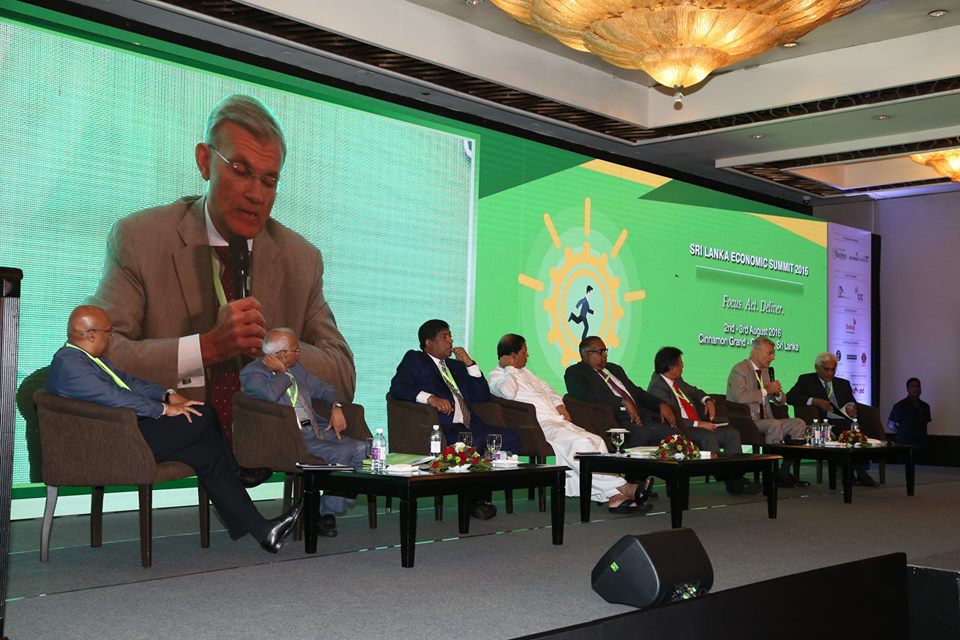August, 2, 2016

Sri Lanka’s economy was thoroughly evaluated at the Sri Lanka Economic Summit which commenced today (August 02, 2016).
Prof. Razeen Sally, who is Chairman at the Institute of Policy Studies and a panelist at the event, expressed his thoughts on the country’s monetary and fiscal economic policies and said that as per his assessment, the high expectations for Sri Lanka have not been met and perhaps “even had a kick in the stomach”.
“Sri Lanka has had a long and sorry record with its macroeconomic policy, fiscal in particular”, Prof. Sally said. “In my assessment, the excesses of the Rajapakse years have not been fundamentally corrected so far and in some respects have got worse.”
https://www.youtube.com/watch?v=2Pic7_BfvJM
He further pointed out that there has been “excessive increases in public sector spending, salary increases, new entitlements” and that the country’s tax system has deteriorated. Prof. Sally also stated that there have been “too many adhoc measures on taxation” and that businesses are highly “vexed” due to unpredictability.
Prof. Razeen’s speech emphasized that there has been “supreme idiocy of extra price controls” and that by creating inflation and by having import protection, the government “puts burdens on consumers” and “puts new burdens on producers and entrepreneurs in the form of tax controls”.
Additionally, he went on to welcome the appointment of the new Central Bank Governor, saying that he “understands the situation very well” and wished the Governor success in “achieving his targets in re-securing the integrity of the Central Bank”.
When discussing what needs to be done to address the circumstances, Prof. Razeen said he personally believed in four priorities;
1. There should not be any further adhoc tax measures nor further unsustainable public sector expenditure increases.
2. Fiscal consolidation is absolutely essential and at the heart of it is a program of tax reform.
3. We need a new package to improve the domestic business climate.
4. “We need a new trade policy”. He placed emphasis on the program of unilateral liberalization and simplification on tariffs, the customs systems and the opening up of sectors that are closed to foreign investment.
He also added that the country has to be “more ambitious and aim for agreements with our two main export markets, the EU (and UK) and the United States”. However, this would all be a mere “economic wish list” if important political changes, including better appointments for key positions, are not made. In concluding his speech, he pointed out that if the window of opportunity is squandered, things might unravel”.
Panelist and President of Business Management School, Mr. Weerakoon Wijewardena had the following to say,
“If we look at the main ailment of the country in the past, it’s just like we invited the whole population of Sri Lankans to dance on the dance floor without knowing how they might be able to perform the next day.
There was a big punchbowl and it was filled by the Central Bank by printing money, by the banking sector by creating excess liquidity in the market, by the government borrowing from domestic and external sources and therefore, the people were very happy and they were dancing.
All of a sudden last week, the Governor took away the punchbowl. He raised the interest rates and he gave a very serious signal to all of us that the particular dancing cannot take place forever.
We have to support the Minister of Finance in his attempt to bring about macroeconomic stability, but unfortunately, what we see is that some of the policy measures that he is taking would be countered to the Central Bank’s policy rate increase.”
Among the many metaphorical statements that Mr. Wijewardena made, he also stated that the Central Bank Governor and the Finance Minister need to have a proper economic policy plan which would reinforce the action taken by each institution and that Sri Lanka should eventually use a complex technology based export system as a “final rescue for the country if we look at the future sustainable economic growth”.
Video Story